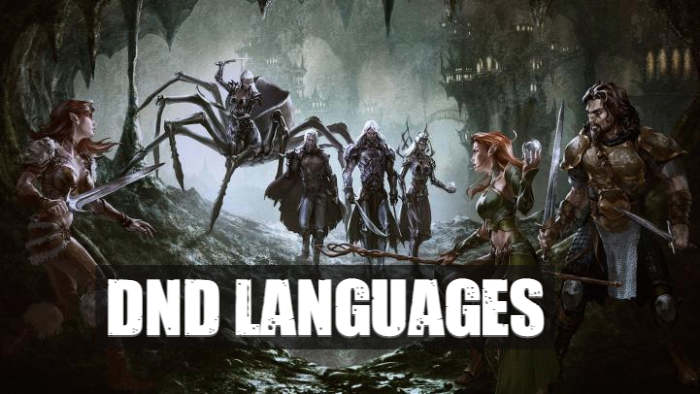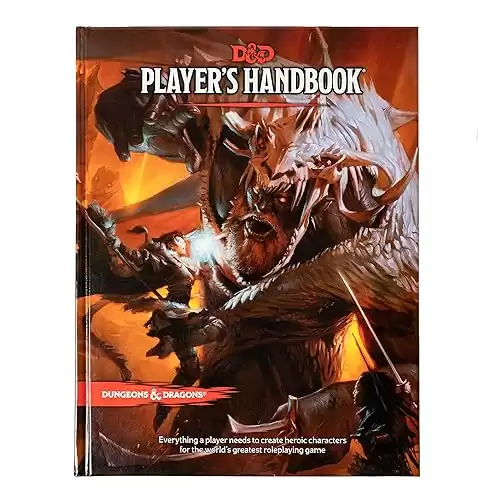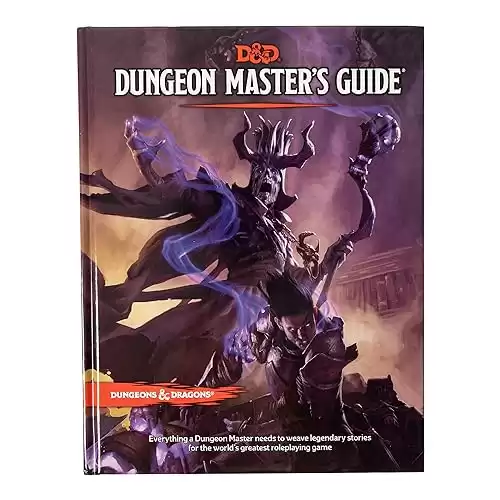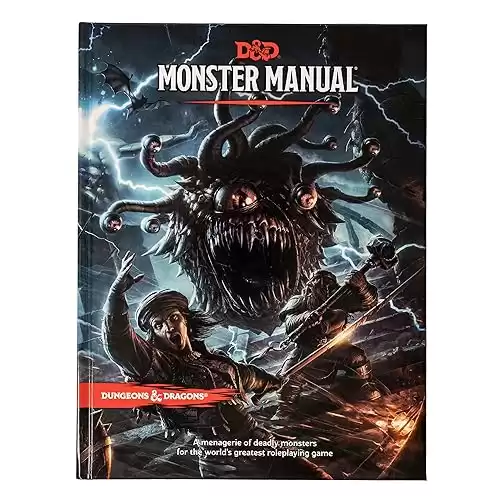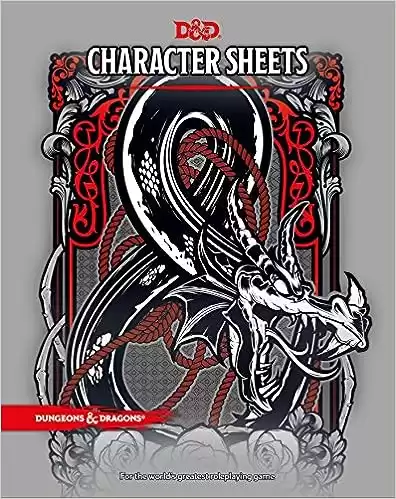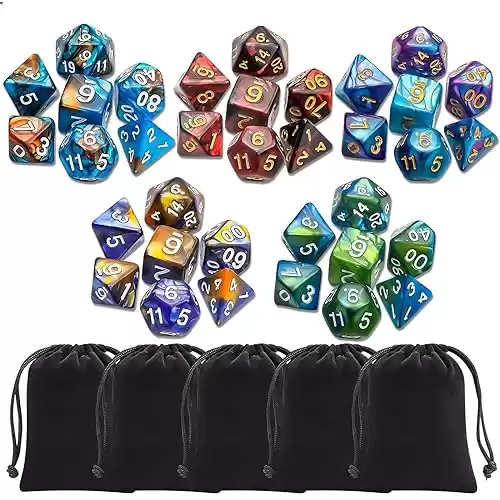Many players see Dungeons and Dragons as a chance to interact with an exciting world. For players that love roleplaying, languages can help immerse them in a campaign. Languages are often a small part of the game, but how you use them can say a lot about your character, your setting, or the group you play with.
Languages don’t often play a big role in games, but they have plenty of interesting uses for players willing to explore them. Most languages are based on their typical speakers. Elves know Elvish, Dwarves know Dwarvish, and so on. Sometimes a category of creatures, like Demons, will have their own language, or a specific monster might speak in its own unique tongue. Players will get most of their languages at the start of a campaign, but there are ways to learn more during gameplay.
This article will tell you everything you need to know about languages. Whether you’re looking for a comprehensive list of DnD languages or you want your character to know as many languages as they can, you’ll find everything you’re looking for right here.
Abbreviations
Before we get too deep, l want to take a moment to discuss how this article is structured. There are sections for many different types of languages, as well as character creation options like race, class, and background that all let you learn more languages.
This article is a complete guide to D&D languages in 5e, so it pulls from a lot of different materials. If any particular language or feature piques your interest, I want you to be able to find its source material easily. That way, you can reference it in your own games with ease. If you see any abbreviations you don’t recognize, you can come back to this table and find its original source material.
| Book Name | Abbreviation |
| Acquisitions Incorporated | AI |
| Baldur’s Gate: Descent into Avernus | BG |
| Curse of Strahd: Character Options | CoS |
| Explorer’s Guide to Wildemount | EGW |
| Guildmaster’s Guide to Ravnica | GGR |
| Ghosts of Saltmarsh | GoS |
| Monster Manual | MM |
| Mordenkainen’s Tome of Foes | MTF |
| Mythic Odysseys of Theros | MOT |
| Player’s Handbook | PHB |
| The Wild Beyond the Witchlight | TWB |
| Tomb of Annaihilation | ToA |
| Van Richten’s Guide to Ravenloft | VRG |
| Volo’s Guide to Monsters | VGM |
| Xanathar’s Guide to Everything | XGE |
What Are the DnD Languages?
You might only use a few languages in a typical campaign, but there’s a wide variety available to you. Between official languages and custom, setting-specific languages, there can be limitless options for how your characters communicate.
Below, I’ve broken down the languages based on their rarity, who uses them, and what settings you can find them in.
Standard Languages
These eight languages are the most commonly used in the Forgotten Realms, the default setting for D&D 5e. These don’t have to show up in your campaign, but they’re the most frequently used languages across the game.
| Name | Typical Speakers | Script |
| Common | Humans | Common |
| Dwarvish | Dwarves | Dwarvish |
| Elvish | Elves | Elvish |
| Giant | Ogres, giants | Dwarvish |
| Gnomish | Gnomes | Dwarvish |
| Goblin | Goblinoids | Dwarvish |
| Halfling | Halflings | Common |
| Orc | Orcs | Dwarvish |
Exotic Languages
In the Forgotten Realms, these languages are much less common. Even in a campaign that takes you from plane to plane, fending off otherworldly threats, you likely won’t get to use all of these. If your character knows any exotic languages, there’s likely a good reason for it in their backstory.
| Name | Typical Speakers | Script |
| Abyssal | Demons | Infernal |
| Celestial | Celestials | Celestial |
| Deep Speech | Mind flayers, beholders | None |
| Draconic | Dragons, dragonborn | Draconic |
| Infernal | Devils | Infernal |
| Primordial | Elementals | Dwarvish |
| Sylvan | Fey | Elvish |
| Undercommon | Underdark traders | Elvish |
It’s also important to mention that Primordial is particularly interesting. It’s the language of elementals, and each element has their own dialect:
- Aquan = Water
- Auran = Air
- Ignan = Fire
- Terran = Earth
Some creatures only speak one dialect, but they’re all considered a variation on Primordial. How well your characters can communicate with different dialects is up to the DM, and the whole table should know the rules if your campaign will revolve around the elements.
Monstrous Languages
While some monsters might use one of the previous languages, like Giant or Draconic, others have a language all their own. For the most part, these languages are so specific that players won’t get much use out of them. In the right setting, however, languages like Gith or Thri-Kreen could be crucial. Talk to your DM before selecting one of these languages just to make sure you’re getting something you can use during gameplay.
- Aarakocra – MM
- Blink Dog – MM
- Bullywug – MM
- Giant Eagle – MM
- Giant Elk – MM
- Giant Owl – MM
- Gith – MTF
- Gnoll – MM
- Grell – MM
- Grung – VGM
- Hook Horror – MM
- Kruthnik – MTF
- Modron – MM
- Otyugh – MM
- Sahuagin – MM
- Slaad – MM
- Sphinx – MM
- Thri-Kreen – MM
- Tlincalli – VGM
- Troglodyte – MM
- Umber Hulk – MM
- Vegepygmy – VGM
- Winter Wolf – MM
- Worg – MM
- Yeti – MM
Class-Specific Languages
Almost every language we’ve seen so far has been based on which creatures use it. However, there are some languages that are based on class rather than race.
Druidic is a secret language that all 1st level druids know. They can communicate with it normally, and they can also use it to leave secret messages for other druids.
“You and others who know this language automatically spot such a message. Others spot the message’s presence with a successful DC 15 Wisdom (Perception) check but can’t decipher it without magic.”
Player’s Handbook (pg. 66)
Thieves’ Cant isn’t exactly a language, but it can function like one. Thieves’ Cant is a code that rogues (starting at 1st level) can use to convey hidden messages. They can use this code to convey secret messages, but it takes about four times as long as it would to say it normally. They can also use signs and symbols to convey simple ideas to other rogues.
Both of these languages provide perfect opportunities for roleplaying. Whether you want to leave messages for allies or use these languages to gain someone’s trust, Druidic and Thieves’ Cant let clever players run wild.
Setting-Specific Languages
Of course, not every language shows up in every setting. Some settings even have their own unique languages. Some are based on race, but others are based on location and culture. Listed below are the languages used in some other popular settings:
Eberron
- Riedran
- Quori
Ravnica
- Kraul
- Loxodon
- Merfolk
- Minotaur
- Vedalkan
Wildemount
- Marquesian
- Naush
- Zemnian
Which Races Give The Most Languages?
Now that you know what languages are available, let’s take a look at how you learn them.
I’ve already mentioned that humanoid races and monsters often have their own languages. As a result, the race you play as will play a big role in which languages you know.
Most races give you at least two languages: Common and whatever language is associated with that race. However, some give you three languages from the start, and they might even let you choose what you know. If you want to know as many languages as possible, then you’ll need to pick from the following:
| Race | Languages | Source |
| Aarakocra | Common, Aarakocra, Auran | Elemental Evil Player’s Compendium |
| Aetherborn | Common, any two | Plane Shift – Kaladesh |
| Changeling | Common, any two | Eberron: Rising from the Last War |
| Firbolg | Common, Elvish, Giant | Volo’s Guide to Monsters |
| Half-Elf | Common, Elvish, any one | Player’s Handbook |
| High Elf | Common, Elvish, Giant | Player’s Handbook |
| Kalashtar | Common, Quori, any one | Eberron: Rising from the Last War |
| Merfolk | Common, Merfolk, any one | Plane Shift – Ixalan/Zendikar |
| Sea Elf | Common, Elvish, Aquan | Mordenkainen’s Tome of Foes |
| Shifter | Common, Quori, any one | Eberron: Rising from the Last War |
| Vahadar Elf | Common, Elvish, any one | Plane Shift – Kaladesh |
| Vedalken | Common, Vedalken, any one | Guildmaster’s Guide to Ravnica |
| Verdan | Common, Goblin, any one | Acquisitions Incorporated |
| Yuan-Ti Pureblood | Common, Abyssal, Draconic | Volo’s Guide to Monsters |
Which Subclasses Give Languages?
Of course, race isn’t the only factor that lets you learn more languages. It’s much more rare, but what class you choose can also give you additional languages. For the most part, you can only get extra languages this way by picking a certain subclass. However, there are some classes that give you languages by default.
We’ve already covered that druids give you Druidic and that rogues give you Thieves’ Cant. However, the best class for learning new languages just so happens to be my personal favorite: Ranger.
As part of the “Favored Enemy” feature, you get to learn a language that your foe speaks. When you pick additional enemy types, you also get additional languages. This means that rangers learn a new language at 1st, 6th, and 14th level. If you use the “Deft Explorer” feature from Tasha’s Cauldron of Everything, you also get another two languages of your choice!
You might not want to be locked into ranger just because it gives you extra languages, though. If you just want one or two specific languages, there are plenty of subclasses that give that to you.
| Subclass | Class | Languages | Source |
| College of Eloquence | Bard | Universal Speech | Tasha’s Cauldron of Everything |
| Knowledge Domain | Cleric | Any two | Player’s Handbook |
| Circle of the Shepherd | Druid | Sylvan | Xanathar’s Guide to Everything |
| Cavalier | Fighter | Any one | Xanathar’s Guide to Everything |
| Rune Knight | Fighter | Giant | Tasha’s Cauldron of Everything |
| Samurai | Fighter | Any one | Xanathar’s Guide to Everything |
| Way of the Ascendant Dragon | Monk | Draconic or any one | Fizban’s Treasury of Dragons |
| Drakewarden | Ranger | Draconic or any one | Fizban’s Treasury of Dragons |
| Mastermind | Rogue | Any two | Xanathar’s Guide to Everything |
| Draconic Bloodline | Sorcerer | Draconic | Player’s Handbook |
| Storm Sorcery | Sorcerer | Primordial | Xanathar’s Guide to Everything |
| School of Divination | Wizard | Read any language | Player’s Handbook |
Which Backgrounds Give Languages?
Lastly, another big way to get additional languages is by picking certain backgrounds. Since race usually gives you specific languages, and class usually gives you none, this is how most players get the niche languages they want. Maybe you want to be a priest who can actually talk to the celestials you pray to, or a scholar who needs Draconic for field research. If languages are a part of your character concept, background is likely where that comes into play.
One Specific Language
Some backgrounds will give you one language from a short list of options. These are fine as an additional bonus, or if they make sense for your character. Most of these also appear in Ravnica, where there aren’t that many languages to begin with.
RELATED: Unfinity Lands – Full-Art Basics and Ravnica Shock Lands
| Background | Language Options | Source |
| Boros Legionnaire | Celestial, Draconic, Goblin, or Minotaur | Guildmaster’s Guide to Ravnica |
| Clan Crafter | Dwarvish (or another if you know it) | Sword Coast Adventurer’s Guide |
| Golgari Agent | Elvish, Giant, or Kraul | Guildmaster’s Guide to Ravnica |
| Gruul Anarch | Draconic, Giant, Goblin, or Sylvan | Guildmaster’s Guide to Ravnica |
| Feylost | Elvish, Gnomish, Goblin, or Sylvan | The Wild Beyond the Witchlight |
| Izzet Engineer | Draconic, Goblin, or Vedalken | Guildmaster’s Guide to Ravnica |
| Rakdos Cultist | Abyssal or Giant | Guildmaster’s Guide to Ravnica |
| Selesnya Initiate | Elvish, Loxodon, or Sylvan | Guildmaster’s Guide to Ravnica |
Any One Language
Other backgrounds still only give you one extra language, but they let you take their pick. This is the largest group by far, and they cover a wide variety of potential characters.
- Archaeologist – ToA
- Athlete – MOT
- Dimir Operative – GGR
- Faceless – BG
- Failed Merchant – AI
- Far Traveler – SCAG
- Gambler – AI
- Guild Artisan – PHB
- Hermit – PHB
- Inheritor – SCAG
- Knight of the Order – SCAG
- Noble – PHB
- Outlander – PHB
- Plaintiff – AI
- Prismari Student – SCC
- Quandrix Student – SCC
- Rival Intern – AI
- Uthgardt Tribe Member – SCAG
- Volstrucker Agent – EGtW
- Waterdhavian Noble – SCAG
- Witchlight Hand – TWB
- Witherbloom Student – SCC
Any Two Languages
Finally, these backgrounds are for the most prolific polyglots out there. These give you any two languages that you want, which can really help express your character’s area of expertise. Most of these backgrounds tend towards academia, which makes sense.
- Acolyte – PHB
- Anthropologist – ToA
- Azorius Functionary – GGR
- Celebrity Adventurer’s Scion – AI
- City Watch – SCAG
- Cloistered Scholar – SCAG
- Courtier – SCAG
- Faction Agent – SCAG
- Haunted One – CoS
- One language must be exotic
- Lorehold Student – SCC
- Orzhov Representive – GGR
- Sage – PHB
- Silverquill Student – SCC
- Simic Scientist – GGR
FAQ
By now, you have your character’s languages picked out, and you’re ready to sit down and play. But you might be wondering: How else can I learn languages? And how do languages really work during a game? Luckily, I’ve answered the most common questions about how languages work in DnD.
How Can I Learn More Languages?
Even after getting all the languages you can during character creation, maybe you’re still not satisfied. Or maybe a certain language becomes important as the campaign progresses, and learning it can help you in the game’s story. No matter what your reason is, there are ways for you to learn new languages after the game has started.
The easiest way to get new languages is by taking the Linguist feat (PHB). It gives you three additional languages, as well as the ability to create written ciphers. If you’re a half-elf, half-orc, or human, you can also take the Prodigy feat (XGE), which gives you one additional language.
However, some DMs don’t allow feats at their table, or they only allow them under specific circumstances. You might also be hesitant to devote an entire level’s worth of progression to learning more languages. If you’d rather learn through in-game decisions, then you can talk to your DM about using downtime.
Xanathar’s Guide to Everything describes the process of learning new languages during gameplay. With an instructor, time, and gold, it’s possible to learn a new language.
“Receiving training in a language or tool typically takes at least ten workweeks, but this time is reduced by a number of workweeks equal to the character’s Intelligence modifier (an Intelligence penalty doesn’t increase the time needed). Training costs 25 gp per workweek.”
Xanathar’s Guide to Everything (pg. 134)
You’ll need to work with your DM if you want to pursue this option. It might be difficult to find an instructor if the language is obscure, or it might take longer than ten workweeks to learn. It may also be difficult to find such a long stretch of downtime during a campaign, so you might have to spread out your training. Ultimately, try to work with your DM to find a solution that lets you progress how you want while staying true to the world.
What is the Most Common Language In DnD?
The most common language in DnD is, well, Common. Big surprise. This is the default language in DnD, and most, if not all, NPCs will speak it.
Languages for common races, like Elvish or Dwarvish, will also appear frequently in most settings. Beyond that, it really depends on the culture and history of your specific campaign.
What is the Rarest Language in DnD?
There are some obscure languages, like Deep Speech, that may never appear in your campaign. In fact, a gaming group might never use monstrous languages like Modron or Slaad, even over many campaigns. Dark Speech, however, is the rarest of the bunch.
In order to use Dark Speech, you have to be carrying and attuned to the Book of Vile Darkness. This means that only one person in the entire world can talk using Dark Speech, and that’s assuming that the Book of Vile Darkness exists in your setting.
If you can use Dark Speech, though, it can be the most impactful language in all of 5e. You can only read in Dark Speech as an action, and you take 1d12 psychic damage every time you do. However, all non-evil creatures within 15 feet will take 3d6 psychic damage, and there’s no saving throw to prevent it. Dark Speech is the only language that can cause damage all on its own, so perhaps it’s a good thing that only one person can every speak it at a time.
RELATED: Dungeons and Dragons Alignments Explained
Do Languages Matter In DnD?
Languages are an underappreciated aspect of the game. Most characters will rarely use them, but just a few key moments with language can heighten the immersion of your game.
Even though common is the most widely-used language in 5e, that doesn’t mean every town and city defaults to it. In a settlement of mostly Elves, they would likely speak Elvish. If the players try to use common, most citizens can and will reply in common.
However, the party can no longer eavesdrop on conversations, and they mark themselves as outsiders whenever they use common. This approach can keep the players on their toes in an unfamiliar setting without making it impossible for them to progress.
Imagine another scenario where a dungeon’s walls are lined with an exotic language. Maybe no one in the party can read it, or even recognize what it is. If they can’t, they’ll still wonder about it, and it’ll add an element of mystery to your set piece. If they can read it, maybe they can learn more about the dungeon’s history, or its residents. Players will love getting even a slight advantage from something they weren’t expecting.
Lastly, exotic languages are inherently interesting. They’re rare, mysterious, and often associated with powerful creatures. If you have an item that features an obscure language, your players might be more invested in it than they otherwise would be. Perhaps they need to find a translator for a tome written in Infernal, but finding a trustworthy scholar devoted to the Nine Hells is a challenge on its own.
These are just a few examples, so feel free to get creative with how you use languages. How else can languages add small, enriching details to your world? Or how else can they be a major social element of your setting?
How Can I Use Languages In Roleplaying?
The previous examples were focused on the DM’s perspective, but players can use their own languages in interesting ways, too.
When you’re trying to roleplay using languages, it might be helpful to consider how your character knows their languages. Did they learn them at a young age? Were they part of formal training? How your character views their languages will make a big difference in how they use them.
I once played a fighter who grew up with stone giants, isolated from the rest of society. As a result, I decided that she could only read Giant. Yes, this example gave my character a disadvantage, but it can be fun to give yourself small challenges to work around. This decision led to some funny moments, and it made sense for my character.
Maybe your character prefers to speak in a language besides common. They could relish any opportunity they have to use it, and favor their party members who speak it. On the other hand, maybe they hate using one of their languages. It could remind them of a harsh past they’d rather forget, but they’re willing to use it when they have to.
Ultimately, try to think about how your character thinks about their languages. It doesn’t have to be character-defining or overly dramatic; small details can bring your character to life!
End of Session
Languages don’t come up often, but they can fill out your story nicely and enhance your setting’s immersion. Whether you needed to reference obscure languages or wanted inspiration for a new character, I hope you’ve found what you were looking for!
